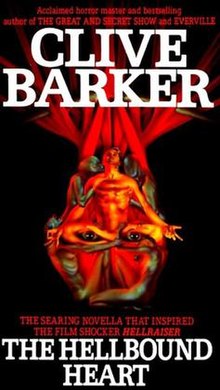I have never really been an avid reader of horror because I was only familiar with two authors. Stephen King seemed too cliché for me and I have a personal rule to avoid anything by H.P Lovecraft. Film wise, I like cosmic horror and more psychological terrors. In the horror world, that basically means Lovecraft and a handful of others inspired by his work.
I have recently stumbled upon the works of Clive Barker. You might know him as the director of “Hellraiser.” This movie was actually based on a book written by Barker called “The Hellbound Heart.” I was generally interested in “Hellraiser” and the book was fairly short, so I thought I’d give it a shot.

What started with a night of trying a new author quickly became a night of finding other works by Barker to read and watch next. Needless to say, I really enjoyed “The Hellbound Heart”
The book got right into the story. You’d think this would leave the reader with an annoying sense of confusion, but that did not happen. This created a feeling of suspense. What was going on was a mystery, but one that was being explained at a wonderful pace. I never felt like I was lagging behind and I never felt like it needed to go faster. It was simply here and now.
One major critique I had was the language used. Some of the words seemed unnecessarily complex to the point where I couldn’t figure out their meaning simply by understanding the context. One line that stood out was, “opening it tripped a musical mechanism, which began to tinkle a short rondo of sublime banality.” Tinkle? Rondo? Banality? Now, I love words and consider my vocabulary large, but I was constantly pausing to look up words. Even if I knew what they meant it felt out of place.
Though bizarre things are happening, the main character in the first section of the book, Frank, doesn’t seem too surprised. He knows what he is doing for the most part. That is an interesting shift from the classic naïve and uniformed horror character.

This novelette is written very well in my opinion. Long sentences are broken up by commas and semicolons as the scenes grow more tense, almost forcing the audience to read in a fast, breathy way. This tactic reminds me of Edgar Allen Poe’s work. I’ve always been a fan of using sentence structure as a way to affect the reader.
I think what I appreciate the most is how the novelette enters the minds of more than one character. Even the way they describe the overarching antagonists, the cenobites, is a sickeningly human perspective. Frank tries to explain this otherworldly thing, but struggles to and settles with oddly human observations. We have insight into the minds of essentially all the named characters.
This book really delves deeper than just pain or violence, but the minds of these characters and human nature in general. The intersection of pain and pleasure isn’t just a theme of the cenobites, but a central part of the human characters.
